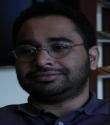To my mind, the revolution was only an escalation of the polarization between those who want change and others adamant on maintaining the status quo.
In February 2011, those who chose the revolution insisted on bringing down the head of the regime to open the gates of change. Their insistence on change caused them to be accused of wanting to drive a rift in society, but those accusations did not stop them from revolting and engaging in street fights on 2 and 3 February, in what came to be called the Battle of the Camel. These battles were a perfect manifestation of that societal polarization.
We now recount what happened in this infamous street battle as a crime that was committed against the revolutionaries, but, recalling the media discourse at the time, we will realize that the revolution was attacked on the basis that it was causing societal polarization and divisions.
I remember that at the time I blogged, calling on people to “declare their inclinations now!”
I said that I might sympathize with security forces for the wounds they suffered in the fighting, but at the moment of confrontation, I would not think twice about kicking their shield or knocking off their helmet, regardless of how evil or noble their intentions were.
The Friday rally that took place on 12 October, dubbed the “Friday of Accountability,” was reminiscent of the street battles that broke out during the revolution. But the new baton bashers should know that such shows of power will no longer be useful.
If we are building a democracy, then we should supposedly abandon street fighting and recognize that there exists a broad spectrum of rights and freedoms for everyone to live in dignity, and that political powers should compete to provide alternatives that achieve justice and preserve human dignity and freedom.
However, if a political faction insists on brandishing the batons of identity and religion, then by so doing it will be establishing itself as a pole that restricts freedoms and rights and concentrates power in a way that reduces society’s ability to hold officials accountable. In that context, I do not understand those who take positions shy of polarization, and fear forming an opposing pole that calls for broad freedoms, guarantees for rights and a political system that distributes powers, allows for accountability and opens the gates to change, pluralism and diversity.
I therefore urge you and myself to announce to which pole we belong and declare our inclinations now — to rights and freedoms, and not to one political faction or another.
I am currently clearly biased to the civil democratic powers pole, which encompasses the Popular Alliance, the Constitution and the Egyptian Social Democratic parties, and the Popular Current.
I choose this pole because I reject the Islamist powers’ belief that the world would be a better place if we eliminate diversity and strictly regulate society in the name of identity preservation or religion.
The tribal conflict between Islamist and civil powers elicits feelings of contempt of the overall political scene. I do not believe that the current conflict will turn into one where fair play is observed. For that to be realized, we need to have a playing field that can accommodate everyone and that should be provided by the new constitution.
The solution is not to ignore or shy away from polarization while the constitution is being drafted. The history of humanity, as well as our recent history, demonstrates that rights and freedoms are either granted by those in power to improve their image and later confiscated, or snatched away in battles and struggles.
In struggles for freedom, the fighters do not fear batons of authoritative rulers or blame from pseudo-moderates who seek appeasement.



